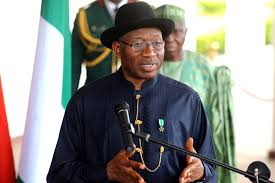Former President Goodluck Jonathan has said that the Western oil companies that discovered crude oil in Nigeria failed to develop the country because they did not transfer technical knowledge or invest meaningfully in local content. Jonathan blamed the situation on the absence of protective laws and a lack of technical know-how at the time Nigeria discovered oil.
Jonathan made these remarks on Wednesday night during the Champions of Nigerian Content Awards Dinner hosted by the Nigerian Content Development and Monitoring Board (NCDMB) in Yenagoa, the Bayelsa State capital. The former president was honoured with the Nigerian Content Lifetime Achievement Award at the event.
While receiving the award, Jonathan recalled his efforts to promote local content when he was president. He said he was eager to sign the Nigerian Oil and Gas Industry Content Development Bill into law in 2010, adding that the bill was originally sponsored by Senator Lee Maeba from Rivers State and others.
He said that before signing the bill, he had visited China in the year 2000 when he was the Deputy Governor of Bayelsa State. During that visit, he led a trade delegation to Daqing, which he described as the “oil capital” of China. There, he said, Chinese officials showed them how the country had developed its oil industry using local skills and manufacturing.
Jonathan compared this with Nigeria’s situation, saying the Western companies that found oil in Nigeria in 1956 continued to import all the equipment and services needed for oil production from abroad. According to him, this left local communities with little or nothing to benefit from the oil found in their land.
He noted that although oil was found in China in 1968—12 years after Nigeria—the Chinese had, by 2000, built a strong oil industry with most equipment and services produced locally. He said this is why he pushed for the Nigerian Content Act, which he signed in April 2010, to encourage the use of local resources, labour, and businesses in the oil and gas sector.
Jonathan said that without proper laws to guide the operations of international oil companies in Nigeria, the host communities have continued to suffer. He pointed out that early laws like the Mineral Oil Ordinance of 1886 and 1914 were not designed by Nigerians and were not aimed at developing the country. He added that the Petroleum Act of 1969, which came after Nigeria’s independence and after oil was discovered in commercial quantities, was the first major law guiding the sector.
He also mentioned the Petroleum Industry Act (PIA), which he said was initiated during his tenure as president but was eventually passed into law in 2021. Jonathan praised the National Assembly that worked with him on the local content law and commended the current leadership of the NCDMB, especially its Executive Secretary, Felix Omatsola Ogbe, for ensuring that the local content law is being implemented.
Jonathan also shared a conversation he once had with a Ugandan who told him that Uganda decided to train its people first before signing oil deals with international companies so they could avoid the same mistakes Nigeria made.
He concluded by saying that although oil companies may claim to be investing huge amounts—sometimes up to $1 billion or more—only a small fraction of that money actually benefits the local economy. Most of the money, he said, is spent overseas since the materials and services are imported.
